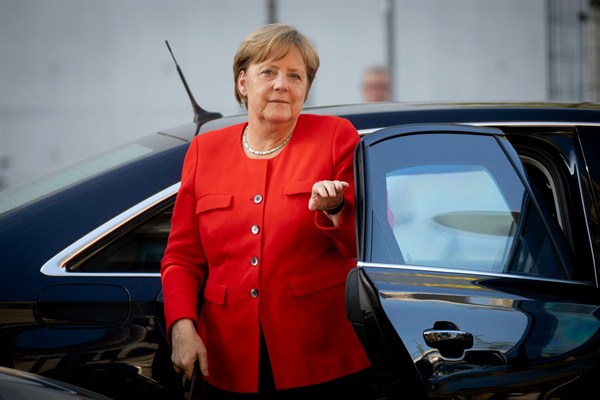After 13 years of relative stability, a politically weakened German Chancellor Angela Merkel has had to endure major upheaval in recent months. Merkel cobbled together a governing coalition after winning re-election last year, but her government is increasingly beholden to the nationalist tendencies of its smallest member, the Christian Social Union, the sister party of Merkel’s Christian Democratic Union. Beyond Germany’s borders, Merkel must confront ongoing divisions within the European Union, lingering questions about how to process migrants and refugees from Africa and the Middle East, and the uncertainty created by the Trump administration’s foreign policy. The following 10 WPR articles examine those issues and Berlin’s possible responses.
The following 10 articles are free for nonsubscribers until Aug. 16.
Merkel, Embattled at Home
How Much Could the Deal to Save Merkel’s Government Cost Her, and Germany?
Germany’s new government survived its first crisis last month when Merkel managed to convince Interior Minister Horst Seehofer, who is also the head of the CSU, to stay in his post rather than make good on his threat to resign unless the government adopted a hard line against immigration. But Andrew Green noted that the process revealed the weaknesses of Merkel’s coalition.
Why the Problems for Germany’s Centrists Are Only Beginning
In December 2017, two months after Germany’s federal elections, the country was on the brink of an unexpected political crisis, with Merkel casting about for coalition partners. Green described why the process proved more difficult than political pundits anticipated.
Germany’s Anti-Climactic Election Masks Problems for Merkel Down the Line
In the lead-up to last fall’s federal elections, the whole exercise seemed like something of an anti-climax. Merkel seemed destined to cruise to another four-year term, while potentially divisive issues would remain unaddressed. But as Green reported at the time, the perceptions of harmony obscured serious challenges for Merkel and Germany at large.
Why Eastern Germany Has Become Fertile Soil for the Far Right
Germany’s far-right forces have been quietly gaining steam in the country’s conservative east for years, developing the potential to shake up national politics. As Eleonora Vio wrote in this in-depth report, groups like Alternative for Germany and Pegida rode the populist wave, mainly against immigration, threatening mainstream parties and pushing German politics to the right.
Trouble Abroad, Near and Far
How Germany Is, Reluctantly, Assuming a Leadership Role in NATO
In the debate over defense spending by NATO members, U.S. President Donald Trump has often singled out Germany for alleged freeriding, saying the country “owes vast sums of money.” Ahead of a NATO summit in May 2017, Tobias Bunde described in an email interview how Germany had ramped up its commitment to the alliance in recent years.
The Cost of a German Breakup With Turkey
In July 2017, Germany’s already tense relations with Turkey took a turn for the worse when the German government abandoned any efforts at de-escalation with Ankara and turned instead to tough talk. Charlotte Brandsma argued that a complete breakdown in ties would not be in either country’s interests, or those of the European Union.
How Merkel’s Migration Gamble Transformed Germany’s Africa Policy
Merkel’s decision to open Germany’s borders in 2015 gave Africa a more prominent place in her foreign policy. Last September, as Germany partnered with several African countries in a bid to stem migration flows, Green examined why she was being accused of helping exacerbate the very conditions that caused people to flee in the first place.
Despite a State of ‘Malaise,’ Germany and Poland Still Need Each Other
In February, Merkel and Polish Prime Minister Mateusz Morawiecki met in Berlin for a tense discussion aimed at mending their countries’ frayed bilateral ties. In an email interview, Piotr Buras discussed the points of friction between them—and where their interests continue to overlap.
Is a Strong France and a Weak Germany the EU’s New Normal?
When Merkel and French President Emmanuel Macron visited Washington in April, coverage of the two visits was dominated by close attention to the interpersonal dynamics between each leader and Trump. But as Judah Grunstein wrote in this column, the visits also highlighted an emerging intra-European dynamic: a strong France and a weak Germany at the heart of the European Union.
German-Russian Relations in the Spotlight as EU Prepares to Renew Sanctions
At the European Union summit held in Brussels in June, the continent’s leaders opted to renew Ukraine-related sanctions against Russia. In an email interview ahead of the summit, Susan Stewart discussed the impact of those sanctions on German-Russian relations and how they have been received in Germany.

